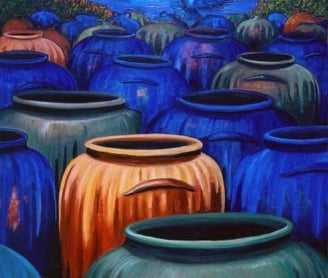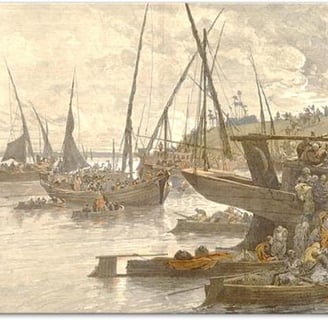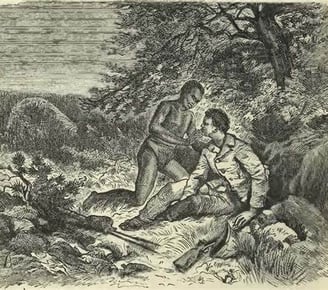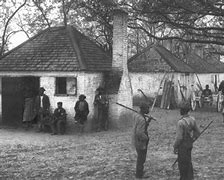African American Maritime History Series #6: African Herbalism in the American Colonies
The forest not only hides man's enemies but its full of man's medicine, healing power and food. African Proverb


Africans have practiced herbalism for thousands of years. The Ebers Papyrus, part of six papyri comprising the oldest surviving Egyptian medical texts. The Ebers Papyrus was written between 2000 BC and 1500 BC in Egypt lists almost a thousand different herbal medicines. Enslaved people from West African, not only brought herbal knowledge with them across the Atlantic, but they also imported the actual seeds. Captains of slaving vessels used the African native roots to treat fevers that decimated their human cargo. The ships’ holds were lined with straw that held the seeds of African grasses and other plants that would be planted in New World soil. Moreover, since the West African climate is similar to the climate in the mid-Atlantic region, the enslaved may have found counterparts to their own plant species. In many situations, white settlers and explorers only survived because of Africans’ knowledge of medicinal plants. Although the exchange of plant knowledge was cross-cultural between the Africans and the Indigenous peoples, there were distinct differences in the way this knowledge was preserved and applied.
Plants brought more than healing to enslaved Africans; they brought light, connection, remembrance, and joy into the otherwise dire and harsh living conditions experienced within slavery and subsequent economic and social oppression. Herbalism practice represented empowerment and healing for enslaved people because there were very few other options for healing.
African herbalism in the American colonies was a rich merger of many cultural traditions with deep origins rooted in African history dating back to ancient Egypt. It included Arab and Asian practices that crossed paths due to trade and cultural exchange on the African continent. As enslaved African people crossed the Atlantic with the transatlantic slave trade, their herbal knowledge and practices were influenced by the Indigenous Americans—as well as appropriated by—European enslavers.


After arriving in the Americas, cohabitation and collaboration with Indigenous Americans meant that enslaved Africans were then introduced to knowledge of local plants and their medicinal ways. Therefore, African American herbalism is a hybrid of all the knowledge that enslaved Africans came into contact with leading up to and throughout their enslavement.
Early African American herbalism was based on a relationship and connection to the land. Enslaved Africans brought the seeds of their homelands braided into their hair and the knowledge of medicinal plants in their stories and songs. However, much of the herbal knowledge gained in America came from direct connection, necessary learning, and the use of plants foraged in the woods, forests, and wetlands that provided a refuge from enslavement on plantations. For enslaved Africans and their descendants, herbalism and spiritual nourishment were intertwined. Plants supported their endurance and resilience in the face of enslavement. Self-treatment, relied on from the earliest colonial period, continued to be prevalent during the antebellum period.
Enslaved Africans regularly sought more contact with Indigenous communities when their medicines weren’t working. The European colonists observed the herbs and plants used by enslaved Africans. There was a complex relationship between colonizers and the enslaved when the practice of herbalism was involved. On one hand, colonizers wanted the enslaved Africans’ healing knowledge, especially when their own remedies were not working, or European medicine was too expensive to import. On the other hand, European colonizers also feared African “root medicines” and did not want enslaved people to be empowered in this way. For enslaved Africans, herbal knowledge was a tool for liberation and spiritual, emotional, and physical health. Highly sought-after herbal supports could even be used as bargaining tools for freedom.


As a result of the autonomy held by enslaved African healers, European colonizers feared poisonings and uprisings. But, they also needed the benefits of the plant medicine provided by the people they oppressed. There were many colonizers who sought to forbid the practice of African herbalism. On May 10, 1740, the South Carolina Assembly enacted the “Bill for the better ordering and governing of Negroes and other slaves in this province,” also known as the Negro Act of 1740. The law prohibited enslaved African people from growing their own food (plants for the practice of herbalism was included), learning to read, moving freely, assembling in groups, or earning money. Shortly thereafter, Virginia followed South Carolina by passing a similar law that made it a capital offense for enslaved people to learn or teach herbal medicine practice.
Health care was rarely provided to enslaved people. Instead, many relied on African folk medicine to treat specific conditions. Many herbal traditions used by enslaved people were not written down but rather passed verbally from person to person. It's important to recognize African herbalism's spiritual component. The process of gathering herbs was a ritual that connected enslaved people to their higher power and the nature around them. As noted by historian Sharla Fett, the ritual of healing helped "maintain proper relationships between living persons and the world of ancestors and spirits." In a time as challenging as the early 17th century was for Africans, they found identity and revelation in plant medicine.


The beauty of folk medicine was in the simplicity of the formulations. Enslaved people did not have access to alcohol or other commodities like the planter class. The time and resources needed to make tinctures — an extraction of plant constituents with alcohol — weren't present for those enslaved. They resorted to using water extractions for the majority of their medicine making. Water infusions are among the simplest to produce, and they are timeless in making formulations or herbal teas.
Formulations made through boiling plant matter and topical poultices are among other preparations enslaved people used. The innate wisdom needed to locate, identify, and utilize these plants is one of the greatest gifts of knowledge demonstrated by humankind.
Illnesses on the antebellum Southern plantation provided myriad opportunities for knowledge interaction between African Americans and plantation owners. The majority of this interaction took place at a personal level, between individuals, facilitated by the fact that the Whites and African Americans living on a plantation were in frequent close contact. The knowledge of African herbalism is not widely known today. It is important to retain this history of the practices, foodways, and knowledge that helped these ancestors survive and build resiliency and solve health issues using ingenuity and sheer will during enslavement.


Support for this series provided by:
Artwork provided by (c) Jonathan GreenOther Images--Public Domain
Sources: Aptheker, Herbert, American Negro Slave Revolts. New York: International Publishers. 1970R. S. Bailey, “Essay on Medical Faith,” Transactions of the South Carolina Medical Association (Charleston, 1856), 20; quoted in Stowe, “Seeing Themselves at Work,”Fett, Sharla M. Working Cures: Healing, Health, and Power on Southern Plantations. Chapel Hill and London: University of North Carolina Press, 2002George W. McDaniel, Hearth and Home: Preserving a People’s Culture (Philadelphia: Temple University Press, 1982)Edward Mitchell, “On the Medicinal Properties of the Black Root,” Charleston Medical Journal and Review 5 (1850)Stanton, Lucia. Slavery at Monticello. Thomas Jefferson Foundation, Monticello Monograph Series, 1996Peter Wood, Black Majority: Negroes in Colonial South Carolina from 1670 through the Stono Rebellion (New York: W. W. Norton & Co., 1974)
Web sources: Cotton, Sarah Mitchell: Bodies of Knowledge: The Influence of Slaves on the Antebellum Medical Community at http://scholar.lib.vt.edu/theses/available/etd-65172149731401/unrestricted/CH1.PDFSavitt, Todd L. “Slave Health and Medicine”: http://www.history.vt.edu/Jones/priv_hist3724/SlaveMed/slaveindex.html


